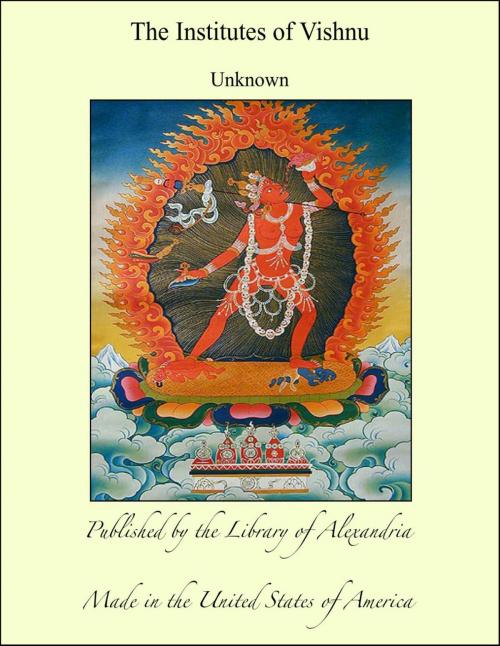The Institutes of Vishnu
Nonfiction, Religion & Spirituality, New Age, History, Fiction & Literature| Author: | Unknown | ISBN: | 9781465575982 |
| Publisher: | Library of Alexandria | Publication: | March 8, 2015 |
| Imprint: | Language: | English |
| Author: | Unknown |
| ISBN: | 9781465575982 |
| Publisher: | Library of Alexandria |
| Publication: | March 8, 2015 |
| Imprint: | |
| Language: | English |
THE Vishnu-smriti or Vaishnava Dharmasâstra or Vishnu-sûtra is in the main a collection of ancient aphorisms on the sacred laws of India, and as such it ranks with the other ancient works of this class which have come down to our time. It may be styled a Dharma-sûtra, though this ancient title of the Sûtra works on law has been preserved in the MSS. of those Smritis only, which have been handed down, like the Dharma-sûtras of Âpastamba, Baudhâyana, and Hiranyakesin, as parts of the respective Kalpa-sûtras, to which they belong. The size of the Vishnu-sûtra, and the great variety of the subjects treated in it, would suffice to entitle it to a conspicuous place among the five or six existing Dharma-sûtras; but it possesses a peculiar claim to interest, which is founded on its close connection with one of the oldest Vedic schools, the Kathas, on the one hand, and with the famous code of Manu and some other ancient law-codes, on the other hand. To discuss these two principal points, and some minor points connected with them, as fully as the limits of an introduction admit of, will be the more necessary, because such a discussion can afford the only safe basis for a conjecture not altogether unsupported regarding the time and place of the original composition of this work, and may even tend to throw some new light on the vexed question as to the origin of the code of Manu. Further on I shall have to speak of the numerous interpolations traceable in the Vishnu-sûtra, and a few remarks regarding the materials used for this translation, and the principles of interpretation that have been followed in it, may be fitly reserved for the last. There is no surer way for ascertaining the particular Vedic school by which an ancient Sanskrit law-book of unknown or uncertain origin was composed, than by examining the quotations from, and analogies with, Vedic works which it contains. Thug the Gautama Dharmasâstra might have originated in any one among the divers Gautama Karanas with which Indian tradition acquaints us. But the comparatively numerous passages which its author has borrowed from the Samhitâ and from one Brâhmana of the Sâma-veda prove that it must belong to one of those Gautama Karanas who studied the Sâma-veda[1]. Regarding the code of Yâgñavalkya we learn from tradition that a Vedic teacher of that name was the reputed author of the White Yagur-veda. But this coincidence might be looked upon as casual, if the Yâgñavalkya-smriti did not contain a number of Mantras from that Vedic Samhitâ, and a number of very striking analogies, in the section on funeral ceremonies particularly, with the Grihya-sûtra of the Vâgasaneyins, the Kâtiya Grihya-sûtra of Pâraskara[2]. In the case of the Vishnu-sûtra an enquiry of this kind is specially called for, because tradition leaves us entirely in the dark as to its real author. The fiction that the laws promulgated in Chapters II-XCVII were communicated by the god Vishnu to the goddess of the earth, is of course utterly worthless for historical purposes; and all that it can be made to show is that those parts of this work in which it is started or kept up cannot rival the laws themselves in antiquity.
THE Vishnu-smriti or Vaishnava Dharmasâstra or Vishnu-sûtra is in the main a collection of ancient aphorisms on the sacred laws of India, and as such it ranks with the other ancient works of this class which have come down to our time. It may be styled a Dharma-sûtra, though this ancient title of the Sûtra works on law has been preserved in the MSS. of those Smritis only, which have been handed down, like the Dharma-sûtras of Âpastamba, Baudhâyana, and Hiranyakesin, as parts of the respective Kalpa-sûtras, to which they belong. The size of the Vishnu-sûtra, and the great variety of the subjects treated in it, would suffice to entitle it to a conspicuous place among the five or six existing Dharma-sûtras; but it possesses a peculiar claim to interest, which is founded on its close connection with one of the oldest Vedic schools, the Kathas, on the one hand, and with the famous code of Manu and some other ancient law-codes, on the other hand. To discuss these two principal points, and some minor points connected with them, as fully as the limits of an introduction admit of, will be the more necessary, because such a discussion can afford the only safe basis for a conjecture not altogether unsupported regarding the time and place of the original composition of this work, and may even tend to throw some new light on the vexed question as to the origin of the code of Manu. Further on I shall have to speak of the numerous interpolations traceable in the Vishnu-sûtra, and a few remarks regarding the materials used for this translation, and the principles of interpretation that have been followed in it, may be fitly reserved for the last. There is no surer way for ascertaining the particular Vedic school by which an ancient Sanskrit law-book of unknown or uncertain origin was composed, than by examining the quotations from, and analogies with, Vedic works which it contains. Thug the Gautama Dharmasâstra might have originated in any one among the divers Gautama Karanas with which Indian tradition acquaints us. But the comparatively numerous passages which its author has borrowed from the Samhitâ and from one Brâhmana of the Sâma-veda prove that it must belong to one of those Gautama Karanas who studied the Sâma-veda[1]. Regarding the code of Yâgñavalkya we learn from tradition that a Vedic teacher of that name was the reputed author of the White Yagur-veda. But this coincidence might be looked upon as casual, if the Yâgñavalkya-smriti did not contain a number of Mantras from that Vedic Samhitâ, and a number of very striking analogies, in the section on funeral ceremonies particularly, with the Grihya-sûtra of the Vâgasaneyins, the Kâtiya Grihya-sûtra of Pâraskara[2]. In the case of the Vishnu-sûtra an enquiry of this kind is specially called for, because tradition leaves us entirely in the dark as to its real author. The fiction that the laws promulgated in Chapters II-XCVII were communicated by the god Vishnu to the goddess of the earth, is of course utterly worthless for historical purposes; and all that it can be made to show is that those parts of this work in which it is started or kept up cannot rival the laws themselves in antiquity.















